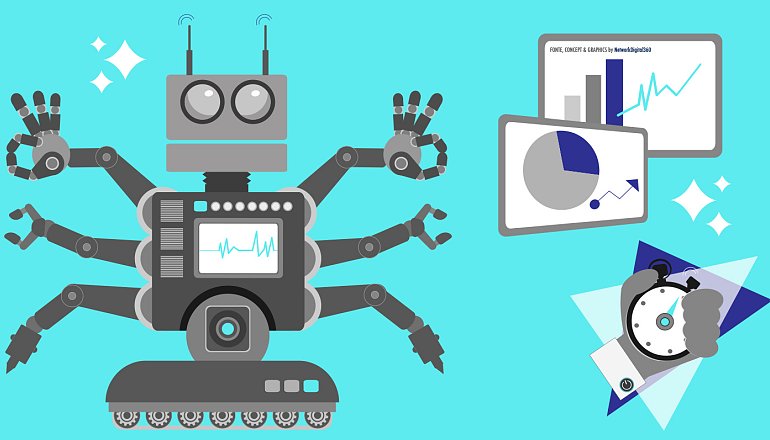
12 Jul
Artificial Intelligence and Machine Learning in ecommerce
Artificial intelligence (AI) and machine learning (ML) are no longer just confined to research and scientific studies, but today more than ever they are becoming an integral part of our lives.
At Cuborio, we are always attentive to new developments and try, where possible, to anticipate the times in order to provide our customers with the best CMS for the creation of the latest generation of ecommerce that is all in Italian and fully customisable so as to allow the creation of a tailor-made and unique online store.
Especially after the Covid-19 pandemic, ecommerce is revolutionising our daily lives, making it easier than ever, having crossed the academic boundary of the classic single ecommerce, giving everyone the possibility of being able to create a multi-vendor ecommerce or m-commerce.
In recent years, many technological advances have occurred through the use of artificial intelligence and machine learning. Almost all sectors have been affected and ecommerce is no longer an exception. Artificial intelligence is rapidly changing the e-commerce industry, from personalised product suggestions to chatbots that behave like real people.
The benefits of artificial intelligence and automatic language applied to the business world
The benefits that artificial intelligence and automatic language can bring to e-commerce are manifold. Artificial intelligence is also being adopted in e-commerce at a phenomenal rate. According to a US study, 80% of employees in the retail sector expect their employer to use artificial intelligence by 2027. According to the same study, artificial intelligence was used by 51% of e-commerce companies to improve customer service, marketing and sales.
1. Reducing human error
The ability of artificial intelligence to drastically reduce errors and improve accuracy and precision is one of its main advantages. Every decision made by artificial intelligence is based on already obtained data and a series of algorithms. If coded correctly, these errors can be completely eliminated.
2. Zero risk
Another significant advantage of AI is that it allows people to avoid many dangers by delegating certain tasks to AI robots. Metal-bodied machines are resilient by nature and can survive hostile environments, making them ideal for defusing bombs, travelling in space and exploring the depths of the oceans. In addition, they can perform accurate jobs with greater responsibility and durability.
3. 24×7 availability
Numerous studies have shown that people only work productively for three to four hours a day on average. People also need breaks and holidays to balance their personal and professional lives. However, AI is able to work uninterruptedly without rest. it is able to multitask with precision and think much faster than humans. With the help of AI algorithms, they can also perform complex and repetitive tasks without difficulty.
4. Digital assistance
Nowadays, almost all large companies contact their customers via digital assistants, thus reducing the demand for human staff. you can ask a chatbot exactly what you need by chatting with it. Nowadays, some chatbots are advanced to the point where it is impossible to distinguish whether you are conversing with a human or a chatbot.
5. New inventions
AI has contributed to the development of innovative inventions in virtually every field to tackle challenging problems. Using cutting-edge AI-based technology, a recent invention helped doctors predict the early stages of breast cancer in women.
6. Impartial decisions
Whether we like it or not, emotions drive human beings. Artificial intelligence, on the other hand, is emotionless (perhaps) and deals with problems in a very practical and logical way. Artificial intelligence has the enormous advantage of impartiality, which allows for more precise decisions.
Artificial Intelligence and Extended Reality in eCommerce
ECommerce allows business owners to manage their online storefronts in a 24/7 virtual environment. it is a world that anyone, anywhere, can access at any time. Advances in technology, machine learning and artificial intelligence have emerged in a new world of work.
Through the lens of technology, we can now see beyond what is actually real. The results of the technological development that fuels the virtual world today are augmented reality and virtual reality. AR, VR, mixed reality and other immersive experiences are all included in the broad category of extended reality (XR).
E-commerce has suffered greatly from the inability to touch or use the product in person, but XR is already bridging this gap with more immersive experiences.
Virtual reality can make virtual objects appear real and offer customers a more immersive, rewarding and interesting product experience.
The user can interact in a virtual world created by augmented reality, offering a more immersive and natural shopping experience.
Customers may be able to make more informed choices about what to buy with the help of such an immersive product experience.
Google found that 66 per cent of respondents prefer to use augmented reality to be assisted with online shopping.
When artificial intelligence and augmented reality come together, their power multiplies. Customers can be offered a more immersive and personalised shopping experience, which increases user engagement and conversion rates. However, these technologies are still in the development phase and have not yet been fully integrated into the e-commerce sector.
Amazon and Walmart, two e-commerce heavyweights, have already started to apply AI and XR to improve the user experience.





